ByMaria Rio, Founder of Further Together Fundraising
I have visited this topic with many colleagues over the past few years. We see “decolonize education,” “decolonize the workplace,” decolonize this and that – but what does that really mean?
Is it ridiculous to think you can decolonize a harmful system? For example, can you decolonize policing? Can you decolonize real estate? If those sound absurd, then why do we not have the same reaction to “decolonize nonprofits”?

The original Tweet can be found here.
There is no way to undo centuries of harm caused by white supremacy. Oppressive systems are designed to maintain power imbalances and marginalize certain groups. They’re not neutral settings where bad things occur; they’re designed to perpetuate inequality. Nonprofits, by design, play into the non-profit industrial complex.
By working toward equitable practices in the areas you as a leader have control over, does that really mean you are decolonizing any extremely harmful and oppressive system capitalism depends on? Does trying to work within these systems reinforce them?
In the past, reflecting on this topic has left me with more questions than answers, but today, I want to put some thought to paper.
Let’s talk about the word “decolonize”
By using the word “decolonize” to replace “how can we take the white supremacy out of this,” we are co-opting and diluting the word itself. By using it as a metaphor for change, we move away from the real meaning of decolonization.
“Decolonization brings about the repatriation of Indigenous land and life; it is not a metaphor for other things we want to do to improve our societies and schools. The easy adoption of decolonizing discourse by educational advocacy and scholarship, evidenced by the increasing number of calls to “decolonize our schools,” or use “decolonizing methods,” or, “decolonize student thinking,” turns decolonization into a metaphor.“ — Decolonization is not a metaphor
By using the word “decolonize” to replace “how can we take the white supremacy out of this,” we are co-opting and diluting the word itself. By using it as a metaphor for change, we move away from the real meaning of decolonization.
To illustrate, let’s compare our use of the word decolonize with colonization. American sociologist Robert Blauner identified the four components of colonization as: “(1) forced entry into a territory and its population; (2) alteration or destruction of the Indigenous culture and patterns of social organization; (3) domination of the Indigenous population by representatives of the invading society; and (4) justification of such activities with highly prejudicial, racist beliefs and stereotypes.” With this definition in mind, I don’t believe there is a true way to decolonize systems. The eradication of Indigenous cultures and Peoples cannot be undone. Instead of leaning towards the sentiments currently associated with “decolonize” – sentiments of undoing the harm that has been done – we should move toward words like “anti-colonial,” which acknowledges that the harm is irreparable.
In their piece “Do Not ‘Decolonize’…If You Are Not Decolonizing: Progressive Language and Planning Beyond a Hollow Academic Rebranding,” Critical Ethnic Studies Journal provides six alternative words one can use instead of decolonizing:
- Diversify your syllabus and curriculum
- Digress from the cannon
- Decentre knowledge and knowledge production
- Devalue hierarchies
- Disinvest from citational power structures
- Diminish some voices and opinions in meetings, while magnifying others
Can spaces free from white supremacy (“decolonized” spaces) exist in oppressive systems?
In short, nope, they can’t.
When we talk about creating “safe spaces,” we think of pockets of safety within a larger framework of oppression. That is not enough; they must be part of a much broader effort to dismantle the oppressive system itself. Otherwise, they’re just “safe for now” spaces.
Think of placing a plant in bad soil. It may survive, but it will certainly not thrive, and the soil will always limit its growth or worse. Unfortunately, even when creating your own safe organization or safe fundraising team or strategy, we have to acknowledge that we don’t exist in a bubble.
“White supremacy is not a shark; it is the water…The water might be more dangerous than the individual shark, but it’s still a concrete force that can be resisted. The first step is seeing it, acknowledging it. That just can’t be the last step” — Kyle “Guante” Tran Myhre
How does this relate to equitable fundraising?
To truly remove white supremacy from fundraising, we need to destroy it in its current form. We need to create a social support system that, by design, is equitable and transformative.
Traditional fundraising perpetuates systemic inequalities. It’s transactional; it focuses on what the donor can get—be it a tax break, recognition, or a sense of superiority—rather than on the needs and agency of the communities. In addition, remember the role nonprofits play in the nonprofit industrial complex: by design, we uphold the status quo.
To truly remove white supremacy from fundraising, we need to destroy it in its current form. We need to create a social support system that, by design, is equitable and transformative. This means moving from “how much can we raise?” to “how can the act of fundraising itself be a form of social justice?”
This doesn’t mean we will have decolonized anything. It means that we are taking steps toward a less harmful and oppressive way to work in the current systems. In actionable terms, fundraising as a tool for social justice could mean participatory budgeting processes where the community decides how funds are used, or who even runs the organization.
But it could also mean:
- Decentralized Power: Explore models that distribute power more equitably among staff, volunteers, and community members. This could mean a co-operative model or a consensus-based decision-making process. An organization I greatly admire does this well; if one person at Foster Advocates doesn’t agree with the proposed budget, they all work together until everyone is in agreement.
- Financial Reparations: The current philanthropic landscape is skewed, with a disproportionate amount of resources going to organizations that are white-led and already well-funded, often perpetuating the status quo. By redistributing wealth to smaller, BIPOC-led groups and non-qualified donees, you’re giving power and agency back to the communities.
- Community-led Boards: We need boards that have people with real lived experience in the issues we are addressing. The more recent, the better. This ensures that the community’s needs and perspectives are not just passively considered. Instead, they would be integral.
- Radical Listening: Implementing “listening sessions” where leadership is silent and employees or community members speak.
The above is definitely not for the faint of heart. It demands that we become accomplices in the fight for justice, not just allies or spectators. It requires us to scrutinize and dismantle the very systems we operate within, even when those systems benefit us. It’s not about creating pockets of less harm; it’s about transforming the soil so that every plant can thrive. Remember that the goal is not to make oppressive systems less oppressive but to completely replace them with systems that are equitable and just.

Maria Rio
Maria Rio (she/her) is a fundraising consultant with Further Together with 10+ years of non-profit experience. She is regularly asked to speak on issues related to fundraising and her op-eds have been featured in national publications. She was a finalist for the national 2022 Charity Village Best Individual Fundraiser Award and has a deep passion for non-profit work. Maria also sits on the Board of Living Wage Canada.
You can connect with Maria through Further Together or through LinkedIn.
Discover more from CCF
Subscribe to get the latest posts sent to your email.


Fantastic article, thank you Maria!
Thank you for giving us a fuller understanding of what “decolonizing” means. I incorrectly understood it in the metaphorical sense. It begs the questions- If we can not decolonize can we actually dismantle systems?
Sincere thanks for this insightful piece of work on decolonization
I am going to be sharing this article whenever I hear someone talk about decolonizing a space. So many folks are uncomfortable with what it truly entails – wholly dismantling the existing colonial structures and reimagining them entirely.